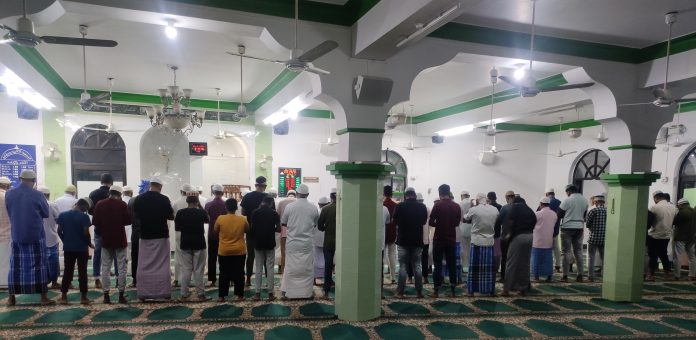Praying together in congregation strengthens the sense of community among Muslims. It creates a bond among individuals who gather regularly for the shared purpose of worship, fostering a supportive and close-knit community.
Radiance News
– Sajida A. Zubair
Andamans, Dec. 25
Salah, also known as namaz or prayer, holds great significance in Islam and is considered one of the Five Pillars of Islam. The importance of Salah is multifaceted, encompassing both spiritual and practical aspects. Salah is a direct means of communication with Allah. It serves as a way for Muslims to establish and maintain a close and personal relationship with the Creator. Through the acts of bowing and prostration, believers express their submission, humility, and devotion to Allah. It is a form of spiritual discipline that helps Muslims maintain mindfulness of Allah throughout the day. By performing regular prayers at specific times, individuals cultivate a sense of awareness, consciousness, and piety in their daily lives.
The routine of daily prayers provides a structured framework for a Muslim’s day. It serves as a source of guidance and direction, helping believers maintain a balance between their spiritual and worldly responsibilities. Regular performance of Salah requires commitment and self-discipline. It instills qualities of punctuality, time management, and self-control, which can have positive effects on other aspects of life. Salah is a means of character development, encouraging qualities such as patience, perseverance, humility, and gratitude. The rituals involved in prayer contribute to the moral and ethical development of individuals. It serves as a shield or protection from engaging in sinful or harmful activities. It acts as a deterrent by reminding individuals of their accountability to Allah.
Salah is not just a set of ritualistic prayers; it’s a comprehensive spiritual, moral, and social practice that plays a central role in the life of a practicing Muslim. It provides a framework for spiritual growth, self-discipline, and a constant connection with the Divine. Yet we see Muslims in general and youth in particular not adhering to the guidelines regarding being punctual with salah. The distraction of Muslim youth from Salah (prayer) can be attributed to various factors in contemporary society.
The pervasive use of smartphones, social media, and digital entertainment can consume a significant amount of youth’s time and attention. Constant connectivity to online platforms may lead to neglect of religious duties, including regular prayer.
In some cases, Muslim youth may face peer pressure that discourages religious practices. Influences from peers who do not prioritize or understand the importance of Salah can contribute to a deviation from regular prayer routines. Demanding academic commitments, extracurricular activities, and career pursuits can lead to hectic schedules. In such circumstances, some youth may struggle to find time for Salah or may prioritize other activities over their religious duties. Insufficient knowledge about the significance of Salah and its role in Islam may contribute to its neglect. When the understanding of the spiritual and moral dimensions of prayer is limited, youth may fail to grasp its importance in their lives.
Addressing these challenges requires a multifaceted approach involving education, mentorship, and community support. Providing comprehensive Islamic education, fostering a strong sense of community, and offering positive role models can help guide Muslim youth back to the fundamental tenets of Islam, including the regular performance of Salah.
In one such effort to bring back youth to the masjids, the Samastha Kerala Sunni Students’ Federation (SKSSF), a student wing of Samastha Kerala Jammiyathul Ulema-Kerala, initiated a campaign ‘Start With Fajar’ for forty days. The mission of SKSSF is to extend support and guide the youth to walk on the path of Deen by giving special emphasis on their academics as well as spiritual education. The idea of the campaign began with the realization of how spiritually awakened the youth are and to what extent the obligatory duties are fulfilled by them.
In order to encourage youth to attend Fajr salah, the SKSSF Wimberley Gunj Unit of SKSSF-Andaman collaborated with Holy Mount Travels to gift a free Umra package to those who regularly attended these forty days. More than 100 participants registered for this initiative. According to one of the participants, the initial motivation to attend the Fajr salah was the gift, but as days passed, the habit of praying in congregation was more rewarding than anything else.
After forty days through a draw (qur’aa), PK Ummer Khattab, 21, was selected for a free Umra package by Panakkad Sayyid Sabiq Ali Shihab. Other participants received appreciation gifts from the organizers. A Muhasaba card was given to further inculcate the habits of praying in congregation, Nawafil habit building, and quality time management activities in a day.
Encouraging youth to pray Salah in congregation at the mosque is a practice rooted in Islamic teachings and holds several benefits, both individually and communally. Praying together in congregation strengthens the sense of community among Muslims. It creates a bond among individuals who gather regularly for the shared purpose of worship, fostering a supportive and close-knit community. Praying in Jama’at is a holistic approach that addresses spiritual, social, and educational aspects of their lives. It helps foster a strong Islamic identity, a sense of community and provides a foundation for ethical and moral development.




